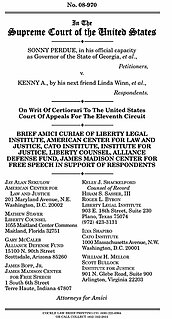Perdue v. Kenny A.
Learn more about Cato’s Amicus Briefs Program.
In order to enforce civil rights guarantees, Congress had two choices: either to expand the Department of Justice to cover all civil rights cases, or privatize the system and allow free market principles to encourage private attorneys to prosecute violations. Congress chose the latter, creating a system of market incentives to encourage private attorneys to enforce civil rights and hold elected representatives responsible for the waste of taxpayer dollars lost in the defense of legitimate civil rights violations and repayment of “reasonable” attorney fees. Here a group of attorneys won an important case for foster children in Georgia, and the court awarded them $6 million in fees based on prevailing hourly rates — the “lodestar” method — and an additional $4.5 million enhancement for the exceptional quality of work and results achieved. At Georgia’s request, the U.S. Supreme Court decided to review the case and determine whether quality of work and results are appropriately considered components of a reasonable fee. Cato, joining six other public interest legal organizations, filed an amicus brief supporting the attorneys. We argue that the enhancement in this case is necessary to preserve incentives in the privatized market. Not only does it encourage attorneys to pursue civil rights abuses, but it provides a powerful disincentive for governments to draw out litigation in the hopes that attorneys will no longer be able to afford pursue it. In addition, quality of performance and attained results are rightly considered as part of the attorney fee calculus. The enhancement here helps to promote the free market of privatized civil rights prosecutions and encourages governments to resolve civil rights cases quickly.

This work is licensed under a Creative Commons Attribution-NonCommercial-ShareAlike 4.0 International License.

